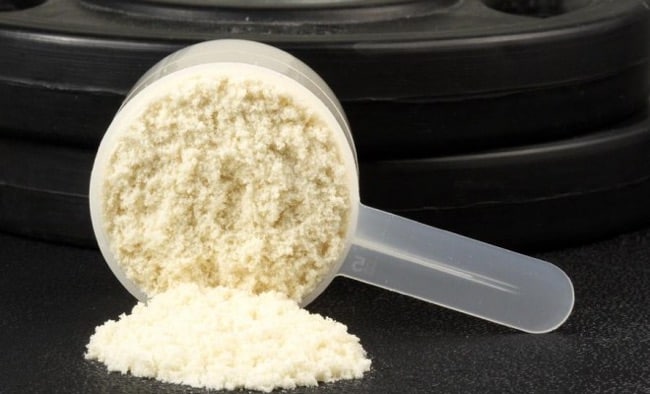
Whey is a protein from cow’s milk. Whey is commonly associated with whey protein powder which is made from separating the two main proteins in milk, whey and casein. The liquid whey part is then dried to form a powder. Whey protein is popular with people who want to build muscle mass because it is rich in amino acids muscles use specifically for rebuilding.
Taking whey protein may offer some health advantages, but it can also have some potential risk factors when taken in high amounts or with certain health conditions.
So, before you start pounding whey protein shakes, read through the whole list of benefits and potential risks.
Increase muscle mass
Amino acids are the building blocks of proteins. The body breaks down proteins to single amino acids that the body can use for a number of functions. Whey protein and other dairy foods are high in a specific type of amino acids, branched chain amino acids (BCAA).
These BCAA have been shown to protect muscle tissue from damage and promote strength growth. Therefore, eating whey protein gives the body a rich source of BCAA which can help benefit muscle growth.
A 2008 study analyzed research subjects who were put on a reduced calorie diet. One group drank a whey protein supplement twice a day and the other group drank an isocaloric drink twice a day.
Researchers found at the end of 12 weeks, both groups lost weight. However, the why protein supplement group lost significantly more body fat and kept more lean muscle mass.
A 2014 meta analysis of research studies looking at the effects of whey protein on weight loss found similar results. Taking whey protein as part of a weight loss diet with or without strength training exercises had beneficial results on weight loss and increasing muscle mass.
Help with fat loss
As mentioned above, whey protein has been shown to help people lose fat loss and keep muscle mass during weight loss. Losing fat mass instead of lean mass is important for health.
A key for weight loss may not be in just adding a bunch of whey protein to your diet, but substituting whey protein for other types of protein or carbohydrate on a reduced calorie diet.
Substituting whey protein for other types of protein can shift the amount of BCAA you are getting. Other protein sources, like from plants, are not as high in BCAA.
Diabetes risk
Can whey protein help with diabetes risk? It could. Whey protein has been shown to stimulate the secretion of insulin, which may be helpful for people at risk of type 2 diabetes. Stimulating insulin secretion could be a harmful thing for people getting doses of exogenous insulin, and stimulating insulin secretion could risk blood sugar dipping too low.
Whey protein may also affect t the rate of food leaving the stomach by slowing it down, which could be beneficial for diabetes risk.
A study from Journal of Proteome Research found that when obese, non-diabetic subjects were given a meal with either a supplement of whey, casein, gluten or cod protein, the whey protein group had a slower release of food from the stomach.
Which type of whey protein?
Whey protein can come in various forms: concentrate, isolate and hydrolysate. In general, whey concentrate can have a varied amount of protein, carbohydrate and fat levels. It may be higher i9n lactose, which could bother people with lactose intolerance.
Whey isolate and hydrolysate have lactose and fat removed, and isolate has a higher protein content. Hydrolysate is considered a pre-digested form of whey protein and is sometimes used for medical supplements.
Some risks of too much whey protein
Whey protein may have some health benefits for weight loss, but keep in mind too much may not be a good thing.
Balance is always important for health and longevity. Having a high protein diet (>35% of calories from protein) long term may cause additional stress on the liver and kidneys.
Also remember many other foods besides whey protein can have health and weight loss benefits.
Don’t over load on whey protein at the expense of other healthy foods.
While whey protein is considered safe for healthy adults, the purity and safety of any supplement is not regulated by the FDA, and consumers use at their own risk.
Some people also report side effects from taking whey protein; if you notice adverse health effects after eating whey protein stop consumption. If you take medication, consult your physician before taking whey protein, as it may interfere with certain medications.
There is little research on the effects of whey protein during pregnancy and breast feeding.
Conclusion
Whey protein has been shown to offer benefit for fat loss and keeping muscle mass. Having whey protein, whether in supplement form or from real food, while on a reduced calorie diet may help with weight loss.
Whey protein can stimulate the release of insulin and delay the release of food leaving the stomach which may be advantageous for people who are obese and at risk for type 2 diabetes.
Keep in mind whey can be found from dairy foods; whey protein supplement is just a concentrated source. Supplements are not regulated by the FDA for purity and safety, so there is always a risk with supplements.
Some people may have adverse reactions to whey protein or it may interfere with some medications.
References used in this article










